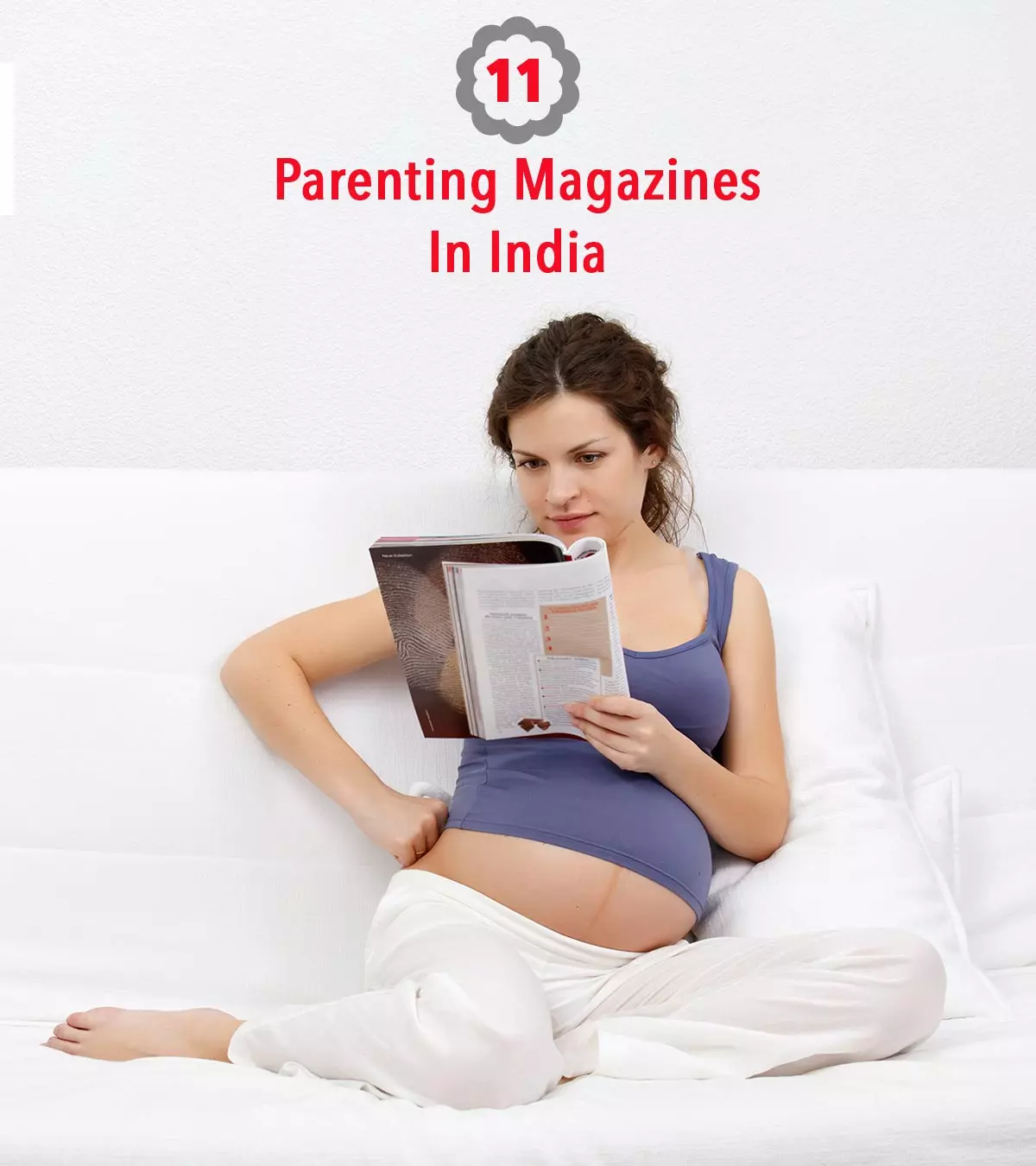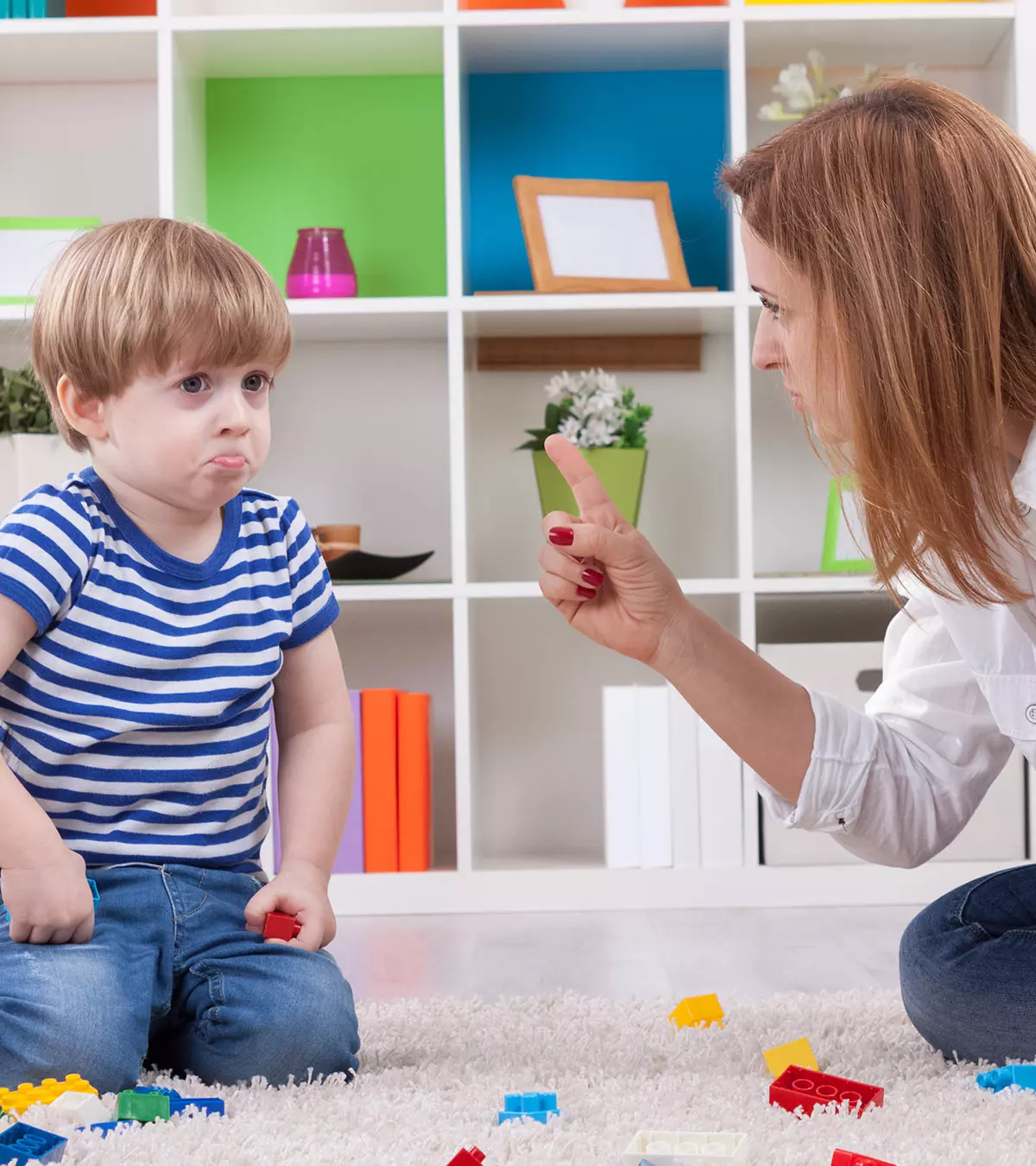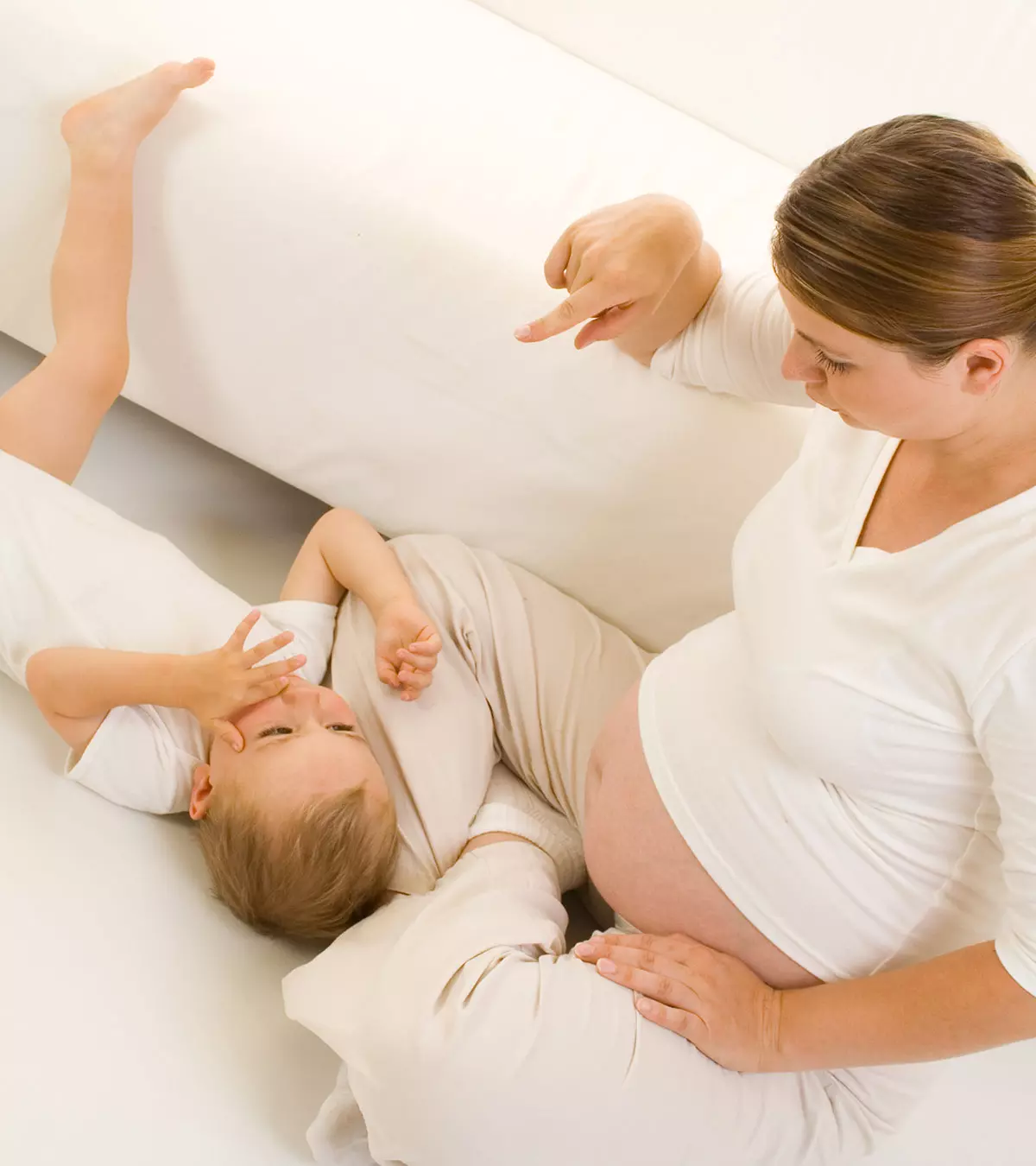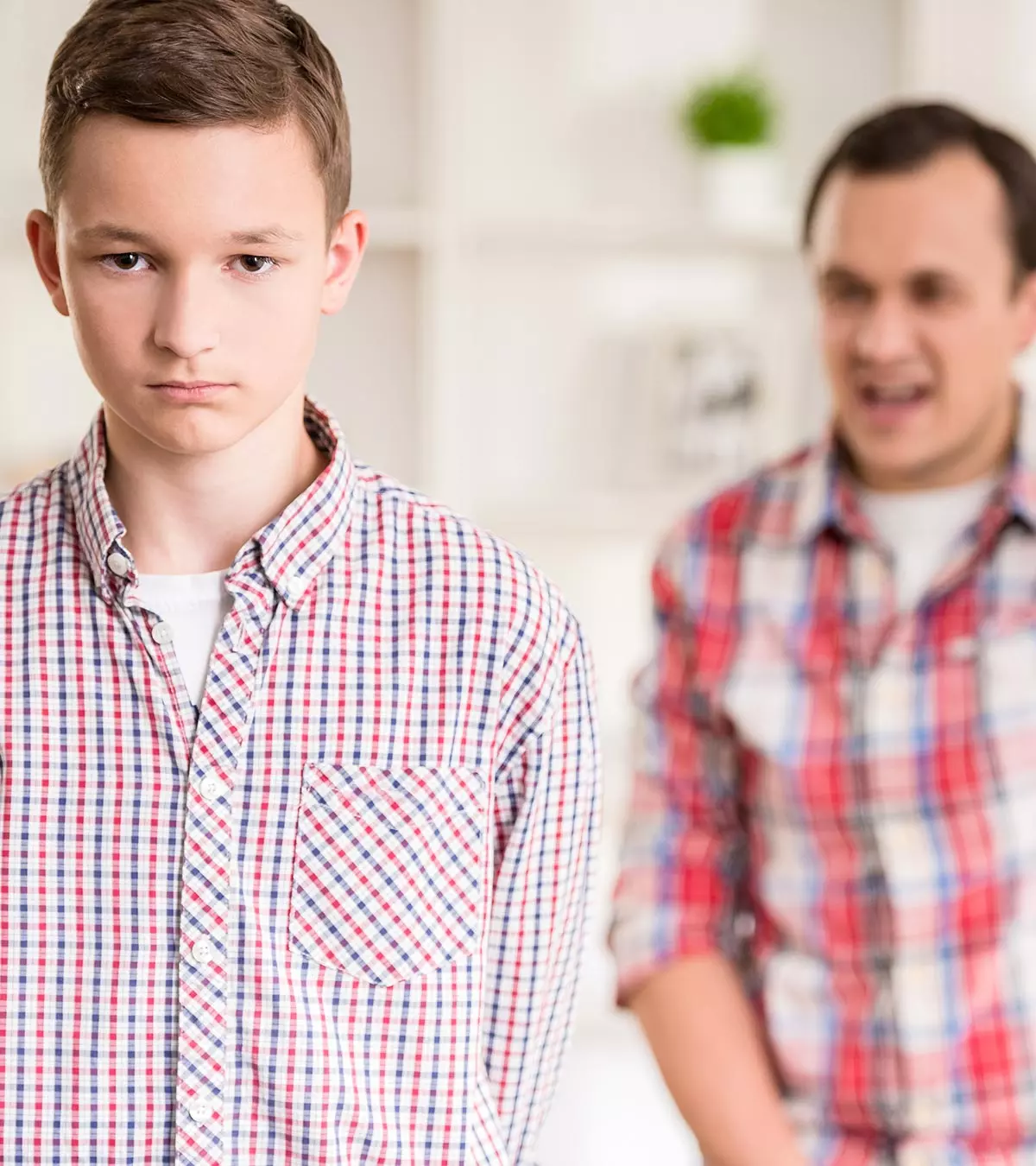
Image: iStock
Parenting is not always easy.

Most parents don’t want to be too strict with their children, but they also want them to grow up disciplined and responsible. However, some parents choose authoritarian parenting and expect their children to follow the rules without compromise. Such parents become disciplinarians and often fail to see things from a child’s point of view and get too harsh with their children.
In this post, we discuss the authoritarian parenting style and its impact on children.
Key Pointers
- Authoritarian parenting is characterized by high expectations and low responsiveness.
- Parents who adopt this style tend to impose strict rules and resort to punishments, with little room for choices or discussion.
- Authoritarian parents may show little empathy towards their children, lack trust, and be emotionally and physically distant.
- This parenting style negatively impacts children’s self-esteem and may result in a fear of failure.
- It can also lead to behavioral problems, poor academic performance, and mental-health issues in children.
- Positive discipline strategies, such as effective communication and giving constructive feedback, can be more effective than authoritarian parenting.
What Is Authoritarian Parenting?
Authoritarian parenting is characterized by high demandingness (expectations) and low responsiveness (meeting the child’s wants and interests). It focuses on obedience, discipline, and control, and is often perceived as tyrannical, providing little nurturance to the child.
This style is also called autocratic parenting. It is one of the three parenting styles originally propounded by developmental psychologist Diana Baumrind in the 1960s (1). The other two styles are authoritative and permissiveiAccepting or tolerating something regularly . You can know more about them here and here respectively.
Authoritarian parents focus on authority. They can be uncompromising and punish the child for failures while ignoring the kid’s achievements. They expect the child to obey them by all means. An authoritarian parent typically believes, “You (the child) need to listen to me because I said so.”
You can understand the style better once you know its characteristics. Let’s see them in the next section.
Characteristics Of Authoritarian Parents
The two essential aspects of authoritarian parents are a highly demanding nature and less responsiveness. Most of the other characteristics fall into these two traits (2) 3:
High demandingness:
Authoritative parents have a long list of demands right from discipline and rules to achievements in life.
They:
- Impose strict rules on children: Authoritarian parents have several rules but do not explain the rationale behind them, which can be quite dictatorial. The children are expected to follow the rules everywhere, whether it’s at home or outside, without asking any questions.

- Resort to punishments: They use punitive punishments such as spanking and abusing the child. Instead of seeing reason, they react impulsively when their children do not follow the rules. It can be seen as borderline oppressive.
- Don’t offer choices to children: Authoritarian parents’ approach to discipline is strictly one way. They don’t discuss the rules with their children before implementing them. The kids are rarely allowed to make a choice.
- Have a low tolerance for indiscipline and misbehavior: Authoritarian parents do not stand misconduct. They expect their children to always behave themselves.
- Shame their children for indiscipline: Authoritarian parents use shame as a strategy and force their children to follow the rules. These parents believe that shaming them will encourage them to follow the rules.
 Did you know?
Did you know?Low responsiveness:
The parents expect the child to perform, but they do not provide them with the necessary support
. They are not there emotionally if the child fails nor appreciate when the child succeeds. They:
- Show no feelings or empathy: Authoritarian parents show no feelings for their children and do not empathize with them. They do not entertain questions or make an effort to understand the child’s emotions.
- Lack trust in their children: Authoritarian parents expect high standards from their children. They do not allow them the freedom to put up their best behavior and make choices. Instead of letting their children make choices, they become overbearing parents who ensure that the kids follow the instructions so that they do not commit mistakes.
- Do not support their children: Their criticism is not constructive. They do not appreciate the child’s effort nor help them do it better next time. They criticize them for failures.
- Do not appreciate the children’s achievements: Even when their children do well in school, they do not recognize or encourage them. They just raise their expectations.
- Are emotionally and physically distant: They hardly provide love and warmth to their children. They do not nurture their children either emotionally or physically.
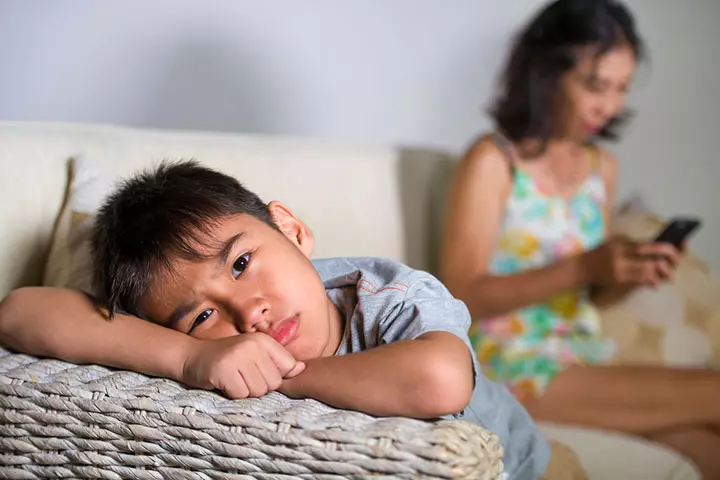
Let’s now see some examples to understand an authoritarian parent’s mindset.
Authoritarian Parenting Examples
Example 1:
A child steals chocolate from the grocery store. When he goes home, the parents get to know about it. They spank him and punish him by not providing dinner. The parents do not try to understand why he stole the chocolate or explain why stealing is a wrong thing.
Example 2:
When the teenage kid asks his dad, “Why should I come back home by 8pm,” the authoritarian parent says, “Because I am saying and you should come back, that’s it.”
Example 3:
A family is having a get-together. While having dinner, a child accidentally drops a fork. His dad immediately yells and insults the child in front of everybody.
When a parent is this stern and dogmatic, the impact on the child is bound to be negative. Let’s see how it affects a child.
Effects Of Authoritarian Parenting On A Child
The consequences of authoritarian parenting are mostly negative than positive. Here are some of the negative effects (3) (4) (5):
- Low self-esteem: Regular criticisms and reminders about how the child ought to and ought not to behave make the child doubt their worth and potential. And when the children’s achievements are not appreciated, they grow up with low self-esteem.
The graph below shows the results of reviewed studies on the impact of various parenting styles on children on the self-esteem of adolescents. For example, 27% of the studies showed that adolescents who grew up under authoritarian parenting scored moderately on self-esteem. Conversely, 13% reported that children raised in authoritarian families had low self-esteem.

Self-esteem rates in children according to the parenting styles
Source: Parenting Styles and Self-Esteem of Adolescents: A Systematic Review; INTCESS/Department of Psychology/Covenant University- Poor social skills: Low esteem results in poor social skillsiAbilities that help one engage and communicate with one another in both verbal and non-verbal ways as the child has difficulty interacting with people in social settings. They find it hard to express their feelings.

- Indecisiveness: Children do not learn to think independently and cannot make decisions. They always wait for guidance from someone and are not proactive. They want others to decide for them.
- Lack self-discipline: The children of authoritarian parents follow the rules well, but they lack self-discipline. Since they are not encouraged to explore and think independently, they never learn to set limits and standards for themselves. This leads to indiscipline when there is no one to monitor.
- Highly insecure: The emotional needs of children are not met as the parents hardly provide love and warmth to their children. This makes the kids insecure.
- Rigid environment suppresses the child: The environment at home is strict and may create unpleasantness in the child. A situation where the home environment is inflexible is not conducive for the child to grow and thrive.
- Lack of creativity: The children do not experiment out of their purview as they are afraid that they might go wrong. The fear inhibits their creativity.
- Cannot accept failure: Fear and anxiety drive them to perform due to parental pressure. They fear failures and cannot see them as a learning opportunity.
 Research finds
Research finds- Behavioral problems: The use of coercive methods such as harshness in the form of corporal punishments and control leads to negative behavior in children. They grow up internalizing violent behaviors.
- Children become hostile: Children of authoritarian parents are forced to do things they do not like. As a result, they turn out to be aggressive when they reach their adolescence. They have a hard time controlling their anger and resentment.
- Poor academic performance: Studies reveal that authoritarian parenting is linked to poor academic performance. Children learn better from positive and constructive feedback than negative criticism.
- Depression and obesity: A study has found that children under authoritarian parenting are more likely to have depressive symptoms than the children of other parenting styles. Another study (6) has observed that the sons of authoritarian mothers are likely to have a high body mass index (7).
- Anxiety: Authoritarian parents often end up being angry, frustrated and loud when the child does not do the things in the way they (the parents) want or when the child does not follow the rules. This leads to anxiety in the child.
There are several adverse effects of authoritarian parenting but there are a few positive ones too.
Benefits Of Authoritarian Parenting
Despite being a strict parenting style, authoritarian parenting has its advantages. Here’s how it helps:
- Discipline: Authoritarian parents emphasize on discipline, rules, and consequences. Hence, the child knows that if they break the rules, they have to bear the consequences. This trains the children to behave well and be disciplined.

- Responsibility: Children become used to following the rules and they never think about doing ‘wrong’ things. The habit becomes so strong that it continues through their adult life.
- A safe environment: Authoritarian parenting focuses on the safety of the children. This protects the children from bad company and wrong decisions.
- Clarity about goals: Authoritarian parents are structured. They have plans, rules, and instructions for everything and their children know what to do to reach their goals.
- Zeal to do things the right way: The children know about the consequences of failure. As they get used to doing things right it becomes a habit and drives them to success.
In spite of its positives, authoritarian parenting is not something psychologists recommend because authoritative parenting provides all these benefits minus the adverse effects.
Authoritarian Vs. Authoritative Parenting Styles
Experts believe that authoritarian parenting affects the child negatively while authoritative parenting style is healthy and has a positive impact on the children.
Here are the differences between the two:
| Authoritarian Parenting | Authoritative Parenting |
|---|---|
| High on demandingness and low on responsiveness | High on demandingness and high on responsiveness |
| Parents don’t discuss the rules with children. They enforce rules and punish the children when they don’t follow them | Parents discuss the rules and take feedback from children. Enforce rules and consequences but explain the rationale behind them |
| Resistance to rules is met with punishment | Resistance to rules is sorted out through discussion |
| Do not allow the child to be independent | Encourage the child to think and live independently. |
| Use punitiveiSomething that involves a punishment methods for punishments | Provide love, warmth, and support |
| Have high expectations for children | Have reasonable expectations that are appropriate to the child’s age |
| Children of authoritarian parents are unhappy and have behavioral problems | Children of authoritative parents are happy, successful, and resourceful |
Parents do not use the same style of parenting throughout their lives; it may change depending on the child’s age and requirements at that age.
How To Change From Authoritarian To Authoritative Parenting?
Every child is unique, and each one requires a different parenting style. But if you find yourself using authoritarian approach and want to shift to authoritative style, here is how you can do that:
- Make changes gradually: Begin with minor changes in your child-rearing style by relaxing the rules and consequences. Forceful and drastic changes can affect your child emotionally and they may not get used to the shift in the style.
Encourage self-discipline in your child to boost their self-esteem and self-motivation.
- Have patience: Give yourself and your child the time to fall into a safe parenting zone. It will not happen overnight. Don’t lose your cool if things don’t work out. Stay calm and have patience. Your positive attitude can encourage your child to learn quickly.
- Talk, discuss, and listen to your child: Keep your communication open with your child. Interact with your child about their day at school, what they liked doing in school etc., to build an emotional connection with them.
 Quick tip
Quick tip
Explain the importance and value of following rules and guide them in the right direction. Be clear about your expectations and tell them how they can reach them.
- Encourage your child to learn from mistakes: Give constructive feedback. Instead of punishing your child, help them understand where they went wrong so that they can do well the next time.
View a broken rule as a life lesson rather than disobedience. Help them realize that failure is a stepping stone to success.
- Have fun while parenting: Parenting is not meant to be serious all the time.
In a similar context, Valicia France, a mother and a writer, shares why she chose to change her Authoritarian Parenting style. She says, “I discovered that Authoritarian parenting did not provide room for growth — neither for me as a parent nor for my son as a growing tiny human… I discovered that Authoritarian parenting did not provide room for growth — neither for me as a parent nor for my son as a growing tiny human. It did not leave room for connecting with my son. And it seemed to be built on a foundation of fear and intimidation, rather than on love and respect.
“I did not want to be my son’s friend, but I did want him to feel comfortable enough to talk to me about life beyond just duty. I wanted him to do the right things, not just because he had to, but because he understood and agreed that those things were best. I wanted him to listen to me out of respect, not because he was scared of me… So…I changed it (ⅰ).”
Frequently Asked Questions
1. Is authoritarian parenting abusive?
Yes, authoritarian parenting can become physically and emotionally abusive as it involves harsh punishment for disciplining a child. Additionally, it does not provide room for discussion or explanation since only obedience is equated to love and respect for the parents (8).
2. Is there any connection between authoritarian parenting and bullying?
Children learn from their parents’ behavior and may behave accordingly with others. Studies have found authoritarian parenting positively associated with bullying and victimization at school (9).
3. Why do parents choose authoritarian parenting?
Parents may use the authoritarian approach for several reasons. They may be dictated by their cultural, social, or ethical background. They may have been raised similarly and are not aware of alternatives, or they may firmly believe that only strict discipline can keep children under control and is beneficial for them (8).
4. How can parents communicate effectively with their children without being authoritarian?
To avoid being authoritarian while communicating with the child, it is essential for you not to impose your demands and opinions on them. Instead, listen to their opinions and perspectives, offer them choices, show empathy, and express your feelings. You may state your expectations to your children, but make sure they are realistic and provide your support and help.
Authoritative parents have high expectations and low responsiveness. They are unyielding, rarely offer choices to children, impose strict rules, and often resort to punishment due to low tolerance for indiscipline and misbehavior. While authoritarian parenting can discipline children and make them responsible, this parenting approach can also result in low self-esteem, poor social skills, and extreme insecurity. Thus, parents should adopt a flexible approach and be more empathetic to their children. Being firm but not too domineering provides a positive parenting environment that gives children confidence and makes them feel loved and respected.
Infographic: Pros And Cons Of Authoritarian Parenting On Children
Every parent has a different perspective and parenting style to groom their children; however, it is crucial to know that each parenting style has its own impact. The infographic below provides insight into the positive and negative effects of the authoritarian parenting style to let the parents reflect and decide about their parenting approach.

Illustration: Momjunction Design Team
Authoritarian parenting can have drastic impacts on your children. Find out in this video, as we explore the impact of strict parenting on your wellbeing.
Personal Experience: Source
MomJunction articles include first-hand experiences to provide you with better insights through real-life narratives. Here are the sources of personal accounts referenced in this article.
ⅰ.It’s okay to change your parenting style.https://medium.com/family-matters-2/its-okay-to-change-your-parenting-style-2975b8132ca2
References
- Diana Baumrind; (1967); Child care practices anteceding three patterns of preschool behavior.
http://www.devpsy.org/teaching/parent/baumrind_parenting_styles.pdf - Judith G Smetana; (2017); Current research on parenting styles dimensions and beliefs.
https://www.sas.rochester.edu/psy/people/faculty/smetana_judith/assets/pdf/Smetana_2017_CurrentResearch.pdf - Authoritarian parenting style.
https://www.canr.msu.edu/news/authoritarian_parenting_style - K. Devi; (2014); Parental disciplining and children behaviours: A review.
https://www.semanticscholar.org/paper/Parental-disciplining-and-children-behaviours%3A-A-Devi/37c645072e7e7f1b86369984ecec43b23f7dff1d?p2df - Kristal Lea Sommer; (2007); The Relationship Between Parenting Styles Parental Reading Involvement Child Behavior Outcomes Child Classroom Competence And Early Childhood Literacy.
https://shareok.org/bitstream/handle/11244/9138/Sommer_okstate_0664M_10974.pdf?sequence=1&isAllowed=y - Keith A. King; (2016); Authoritarian parenting and youth depression: Results from a national study.
https://www.tandfonline.com/doi/abs/10.1080/10852352.2016.1132870?src=recsys&journalCode=wpic20 - Jerica M. Berge et al.; (2010); Parenting Characteristics in the Home Environment and Adolescent Overweight: A Latent Class Analysis.
https://www.ncbi.nlm.nih.gov/pmc/articles/PMC2893139/ - Authoritarian parenting style.
https://www.canr.msu.edu/news/authoritarian_parenting_style - Stelios N Georgiou et al.; (2013); Cultural value orientation and authoritarian parenting as parameters of bullying and victimization at school.
https://pubmed.ncbi.nlm.nih.gov/23390974/ - FSU research: Helicopter parenting hinders children’s self-control skills.
https://news.fsu.edu/news/education-society/2019/11/13/fsu-research-helicopter-parenting-hinders-childrens-self-control-skills/ - Helicopter Parenting, Self-Control, and School Burnout among Emerging Adults.
https://idp.springer.com/authorize?response_type=cookie&client_id=springerlink&redirect_uri=https%3A%2F%2Flink.springer.com%2Farticle%2F10.1007%2Fs10826-019-01560-z
Community Experiences
Join the conversation and become a part of our nurturing community! Share your stories, experiences, and insights to connect with fellow parents.
Read full bio of Carol Ummel Lindquist
Read full bio of Kalpana M
Read full bio of Rebecca Malachi
Read full bio of Apoorva K





